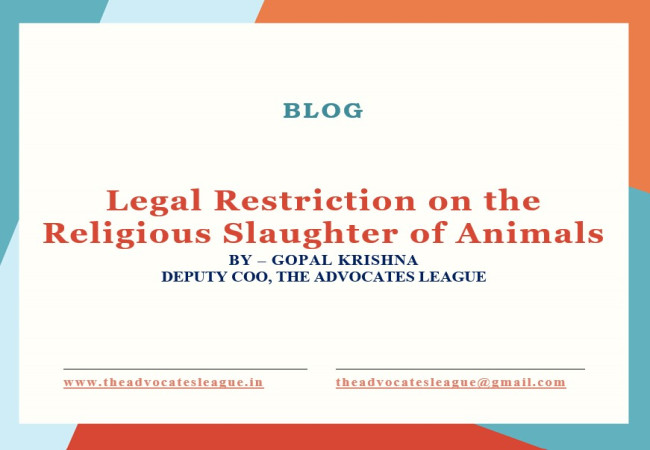Legal Restriction on the Religious Slaughter of Animals

India is a hypocritical country. On the one hand, we worship the animals in different rituals, and on the other hand we kill them in different rituals such as slaughter cow (considered a mother in the major part of the country), and a goat for their meat. Animals are slaughtered for meat in the backdrop of rituals. It involves the practice of slaughtering animals for food production. Nearly 25% of the Muslim and Jewish communities of the world population practice ritual slaughtering which according to them is a mandatory practice. Both Muslim and Jewish communities follow the same philosophy in the context of ritual slaughtering. The government of India has introduced many laws which prohibit the slaughtering of animals. These laws have been introduced because many a time it hurts the sentiments of the people. Prevention of cruelty act 1960 is the basis for the protection of animals in India. It states that for any animal who is subject to unnecessary pain or any unnecessary trauma the owner of the animal will be fined or will be sent to jail for a fixed period. India's animal welfare board was established in 1962 to protect the animals from unnecessary pain and unnatural trauma leading to severe disease or death. The Animal Welfare Act was introduced in 2006 in collaboration with Department for Environment, food and rural affair. It makes a person responsible for an animal to perform all its duties and take his care. Section 428 and Section 429 of the Indian Penal Code 1860 have made animal harm illegal. Section 11 of the prevention of cruelty act 1960. It says that giving the animal any kind of poisonous substance is illegal. These sections also state that the animals cannot be used for experimental purposes. It also mentions that it is illegal to pick up any animal from the street or any municipal place for any purpose and restricting these animals from using their natural habitat is illegal. In the case of Shaikh Zahid Mukhtar and Others versus The State of Maharashtra and Ors 2016. the Court upheld the validity of Section 5C by applying the principle of ‘conscious possession,' which states that ‘possession with the knowledge that the flesh is of a cow, bull, or bullock slaughtered in violation of Section 5 of the prevention of the cruelty to animal act 1960. The Court ruled that Section 5D and Section 9B were unconstitutional because they were not fair, just, or reasonable. The Court held that prohibiting the possession of flesh from a cow, bull, or bullock slaughtered outside the state violates the right to privacy enshrined in Article 21, which is an integral part of personal liberty. In the case of Ramavath Hanuma versus the State of Telangana 2017, the court dismissed the plea of petitioner Ramavath for the return of 63 cows and two bulls as he was going to use those bulls for the festival of Muslims called Bakrid. The court observed that in a major part of India cows are recognized as God hence, it might hurt the religious sentiments of the people. The court stated that the cow is a national wealth and no person can sell it for slaughter and no person has the right to kill it. If you see a dog or a cow being hit or stoned, make sure the perpetrator is aware of the law and that he or she obeys the law of the land. If the abuse continues, file a police report at the nearest police station. There might be chances that the cops don't seem to take the report seriously. They may not be aware of animal-related legislation in many circumstances. By maintaining a pleasant but forceful demeanor. It is against the law for a municipality to pick up stray dogs and discard them outside the city’s bounds, as this puts them in danger of starvation and thirst. As a result, we can take this brutality to court. If you see cows or other animals with burn marks, usually on their rumps, near specific fruit and vegetable markets, the vegetable sellers likely threw acid on the animals to keep them away from their stalls. If there is a market association, we can go to the president of the market and inform him or her of the law. Request that all vegetable vendors be made aware of this practice and tell them that this is illegal and punishable in the eyes of law. If you know of any research institute that uses animals, inquire about the animals’ origins. If you suspect the animals were taken from the street or a pound, or if the animals are being abused, contact the Committee for the Control and Suspension of Animal Experiments. The people at large should understand that following the ritual of slaughtering an animal for meat or food production is illegal and they also have a right to live under article 21 of the Indian Constitution. The government of India has introduced many laws which have been discussed earlier. Hence, this article wants to state that the rights of the animal should be always respected and animals should not be used for slaughtering, or any kind of experiment, and should not suffer from unnatural trauma or pain because animals experience emotions like human beings.
